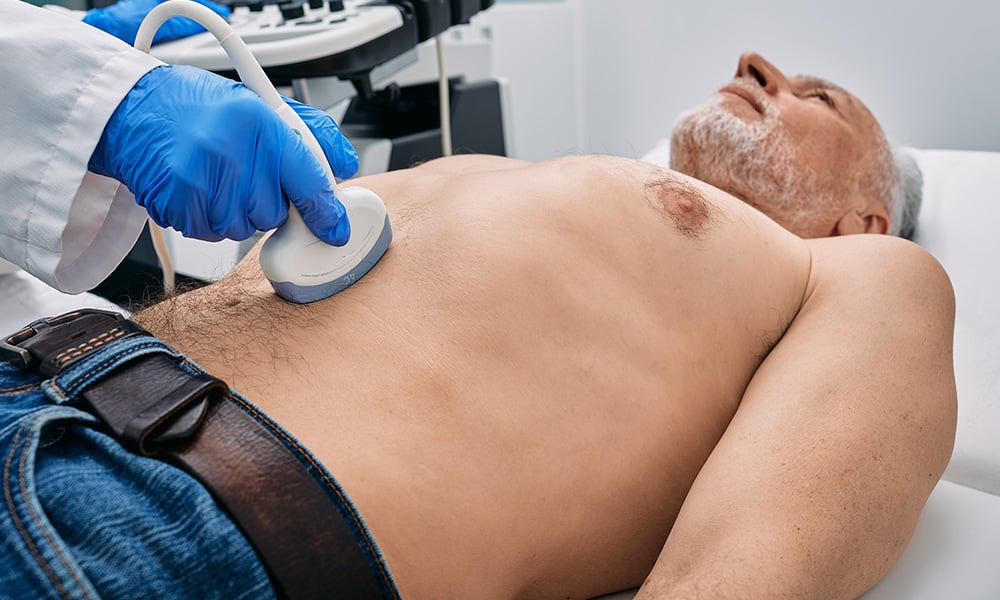AAA & IVC Ultrasound
Heart and Vascular Care has been recognized for its high quality in echocardiography by the Intersocietal Accrediation Commision (IAC).
AAA & IVC Ultrasound

What is an Aortic Aneurysm?
The aorta is the major blood vessel that carries oxygen-rich blood away from the heart to the rest of the body. An aneurysm occurs when a portion of the aortic wall weakens and bulges out like a balloon. This can gradually enlarge over time and eventually rupture if left untreated. Normally, the abdominal aorta is ~ 1.5-3 cm in diameter. An aneurysm is diagnosed if the aorta is > 3 cm in diameter.
Most aortic aneurysms occur in the abdominal region below the kidneys. The rupture of an Abdominal Aortic Aneurysm (AAA) is extremely dangerous and often fatal. Unfortunately, aneurysms frequently do not cause any symptoms until they rupture. This makes screening crucial. Here are some additional facts about aortic aneurysm:
- Ruptured aortic aneurysms are the 15th leading cause of death in the United States.
- The survival rate for people who experience a ruptured aortic aneurysm is about 20%.
- Treatment for aortic aneurysm is most effective when it is done before the aneurysm ruptures.
Treatment guidelines generally recommend consideration of surgical intervention for AAAs once the size reaches 5.5 cm in diameter. In certain circumstances, surgical intervention may be recommended prior to reaching 5.5 cm in diameter, including when the aneurysm grows rapidly (at least 0.5 cm in a year) or if there is a genetic predisposition to aneurysm formation
This innovative procedure reduces the risk of complications, shortens recovery time, and offers a safer option for patients who may not be suitable candidates for open surgery. The goal of AAA stent repair is to stabilize the aneurysm and minimize the risk of rupture, a life-threatening event. Patients who undergo AAA stent repair can experience improved quality of life and reduced long-term health risks associated with untreated AAA.

What is an Aortic Aneurysm?
The aorta is the major blood vessel that carries oxygen-rich blood away from the heart to the rest of the body. An aneurysm occurs when a portion of the aortic wall weakens and bulges out like a balloon. This can gradually enlarge over time and eventually rupture if left untreated. Normally, the abdominal aorta is ~ 1.5-3 cm in diameter. An aneurysm is diagnosed if the aorta is > 3 cm in diameter.
Most aortic aneurysms occur in the abdominal region below the kidneys. The rupture of an Abdominal Aortic Aneurysm (AAA) is extremely dangerous and often fatal. Unfortunately, aneurysms frequently do not cause any symptoms until they rupture. This makes screening crucial. Here are some additional facts about aortic aneurysm:
- Ruptured aortic aneurysms are the 15th leading cause of death in the United States.
- The survival rate for people who experience a ruptured aortic aneurysm is about 20%.
- Treatment for aortic aneurysm is most effective when it is done before the aneurysm ruptures.
Treatment guidelines generally recommend consideration of surgical intervention for AAAs once the size reaches 5.5 cm in diameter. In certain circumstances, surgical intervention may be recommended prior to reaching 5.5 cm in diameter, including when the aneurysm grows rapidly (at least 0.5 cm in a year) or if there is a genetic predisposition to aneurysm formation
This innovative procedure reduces the risk of complications, shortens recovery time, and offers a safer option for patients who may not be suitable candidates for open surgery. The goal of AAA stent repair is to stabilize the aneurysm and minimize the risk of rupture, a life-threatening event. Patients who undergo AAA stent repair can experience improved quality of life and reduced long-term health risks associated with untreated AAA.
What is AAA Ultrasound Screening?
AAA screening uses ultrasound technology to visualize the abdominal aorta. Sound waves create images that can detect even small aneurysms. The ultrasound is non-invasive and painless. If an aneurysm is detected early through screening, steps can be taken to monitor its size and surgically repair it before rupture occurs. This prevents a catastrophic emergency.
Screening is recommended for:
- Men and women ages 65-75 who have ever smoked.
- Anyone over 65 years of age with a first-degree relative with an aortic aneurysm.
- Anyone with signs or symptoms which could be due to a AAA. These may include an audible sound in the belly–called a “bruit” or a palpable mass in the belly, or new, severe pain in the belly that moves to the back.
What to Expect Before, During, and After an AAA Screening:
In preparation for your screening:
- Take 30 mL of milk of magnesia or Gas-X the night before the procedure.
- Do not eat or drink anything after midnight.
- Do not smoke for at least six (6) hours prior to your test.
- Wear a comfortable, two-piece outfit made of loose clothing.
- Please take all medication as prescribed.
The quick, painless ultrasound screening involves using a handheld transducer to generate images of your abdominal aorta using sound waves. Results are usually available immediately, and your doctor will review them with you. If no aneurysm is found, you can feel reassured. If an aneurysm is detected, further assessment or monitoring may be recommended depending on the specifics. For those at higher risk, regular screenings might be advised. Here are some additional things to keep in mind:
- The ultrasound screening is non-invasive, often taking 15-30 minutes.
- The results will reveal the condition of your abdominal aorta and determine if more action is needed.
- Being proactive with AAA screening contributes to your overall vascular health and enables early detection of potential problems.
Am I a Candidate for an AAA Screening?
An AAA (Abdominal Aortic Aneurysm) screening is typically recommended for individuals who meet certain criteria or have specific risk factors. However, it is important to note that AAA screening is not perfect and that there is a small chance that a person with an AAA will not be detected by initial screening alone. Here are some of the factors that may make you a candidate for AAA screening:
- Age and gender
Men aged 65 to 75 with a history of smoking should undergo one time AAA screening, as they are at heightened risk for developing AAA.
- Family history
If you have a family history of AAA, especially in a first-degree relative (parent, sibling, child), you may be at an increased risk and could benefit from screening.
- Tobacco use
Smoking significantly raises the risk of developing AAA. If you are or have been a smoker, your cardiologist may recommend AAA screening if you are over age 65.
- Other risk factors
Conditions such as Marfan syndrome, Ehlers-Danlos syndrome, or a history of aortic surgery may also warrant consideration for AAA screening.
Take Action to Detect AAA Early
If you are a man over 65 and have smoked, or have a family history of aneurysm, it’s important to get screened. Our vascular specialists perform quick, non-invasive AAA screening. Request an appointment today.
Photo Gallery
Video Gallery
Testimonials
Photo Gallery
Get To Know Our Cardiologists

